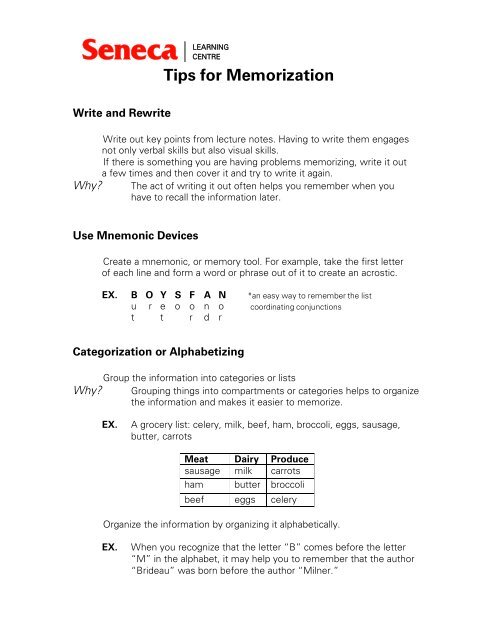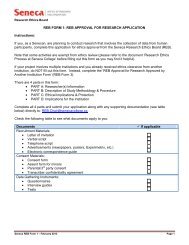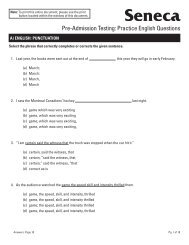Tips for Memorization - Seneca College
Tips for Memorization - Seneca College
Tips for Memorization - Seneca College
Create successful ePaper yourself
Turn your PDF publications into a flip-book with our unique Google optimized e-Paper software.
<strong>Tips</strong> <strong>for</strong> <strong>Memorization</strong><br />
Write and Rewrite<br />
Why?<br />
Write out key points from lecture notes. Having to write them engages<br />
not only verbal skills but also visual skills.<br />
If there is something you are having problems memorizing, write it out<br />
a few times and then cover it and try to write it again.<br />
The act of writing it out often helps you remember when you<br />
have to recall the in<strong>for</strong>mation later.<br />
Use Mnemonic Devices<br />
Create a mnemonic, or memory tool. For example, take the first letter<br />
of each line and <strong>for</strong>m a word or phrase out of it to create an acrostic.<br />
EX. B O Y S F A N *an easy way to remember the list<br />
u r e o o n o coordinating conjunctions<br />
t t r d r<br />
Categorization or Alphabetizing<br />
Why?<br />
Group the in<strong>for</strong>mation into categories or lists<br />
Grouping things into compartments or categories helps to organize<br />
the in<strong>for</strong>mation and makes it easier to memorize.<br />
EX.<br />
A grocery list: celery, milk, beef, ham, broccoli, eggs, sausage,<br />
butter, carrots<br />
Meat Dairy Produce<br />
sausage milk carrots<br />
ham butter broccoli<br />
beef eggs celery<br />
Organize the in<strong>for</strong>mation by organizing it alphabetically.<br />
EX.<br />
When you recognize that the letter “B” comes be<strong>for</strong>e the letter<br />
“M” in the alphabet, it may help you to remember that the author<br />
“Brideau” was born be<strong>for</strong>e the author “Milner.”
Word Meaning as Memory Aid<br />
Why?<br />
Look at the parts that make up the word you are trying to memorize<br />
and try to derive meaning from it.<br />
Often, once you can see how the word is put together, you have<br />
a better understanding of it and it is more meaningful.<br />
EX.<br />
Octo – means 8, so we know that an Octopus’ name comes from<br />
the fact that it has 8 legs.<br />
Association<br />
Why?<br />
Try to make connections between in<strong>for</strong>mation you are trying to<br />
memorize and in<strong>for</strong>mation you already know.<br />
Associating new in<strong>for</strong>mation with old in<strong>for</strong>mation will help you<br />
retain what you are trying to memorize.<br />
EX.<br />
If you have to remember a date such as January 16, 1979, you may<br />
already know that that is the day your sister was born.<br />
Spaced Study<br />
Divide up study time into smaller units rather than large blocks.<br />
Divide how much material you will cover in 45-minute sessions then<br />
stick to it. Take breaks in between to get up and walk around or get a<br />
drink.<br />
Why?<br />
It has been proven that when studying is broken up into smaller<br />
chunks, the time necessary <strong>for</strong> memorization is less. Secondly,<br />
it’s psychologically rewarding to study in smaller periods because<br />
you feel accomplished and make progress.<br />
Visualization<br />
Why?<br />
Try to visualize what you are trying to memorize. Try to picture what<br />
you are studying, whether it is an image from a novel or a diagram from<br />
a textbook.<br />
Draw it. Pick up your pencil and draw out a diagram or chart or graph to<br />
illustrate the concept that you are trying to memorize. This technique<br />
utilized both your verbal and visual skills and will have a greater impact on<br />
memory.<br />
Often a picture of visual representation is easier to recall than a<br />
lengthy verbal description.
Quiz and Discuss<br />
Why?<br />
After you have covered all the material, get together with a friend in<br />
the course and quiz each other on the material covered.<br />
Share in<strong>for</strong>mation with one another and when you’re not sure of an<br />
answer, discuss it.<br />
Having to think about it and explain it to someone else will help<br />
you remember the material when you need to recall it later <strong>for</strong> a<br />
test.

















